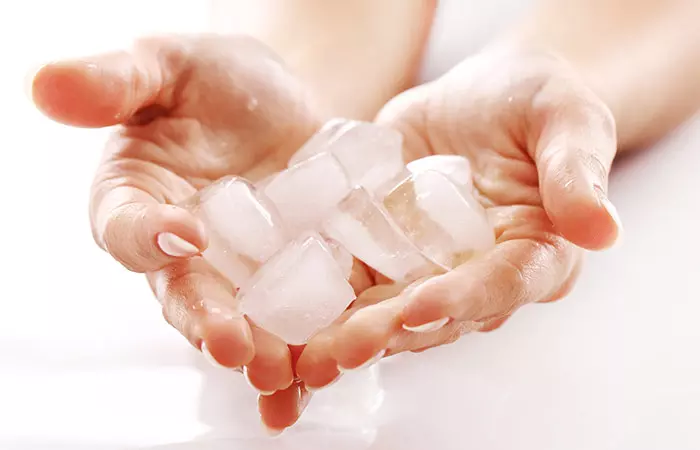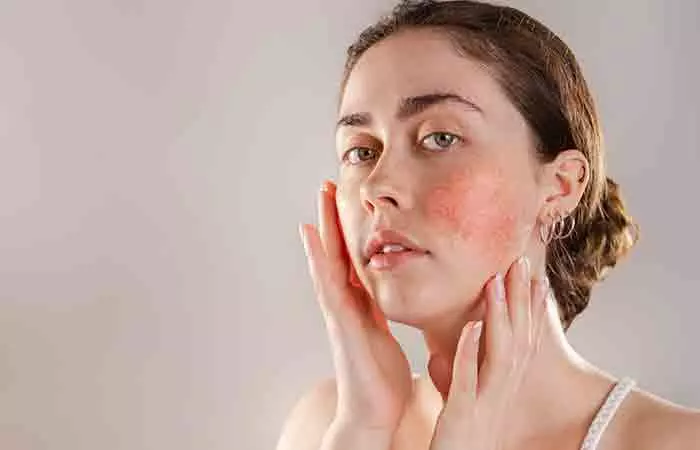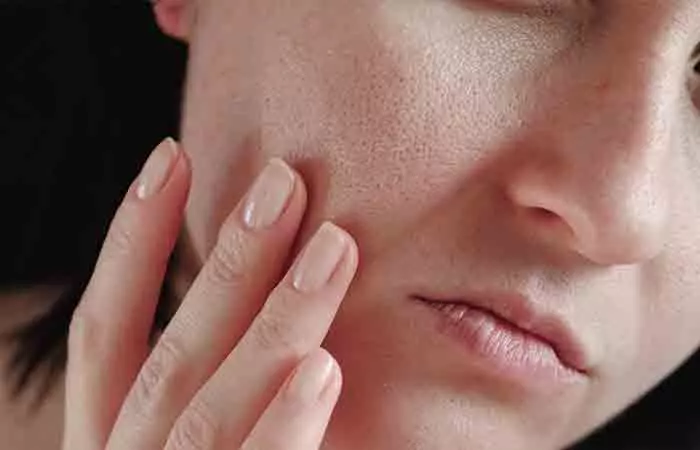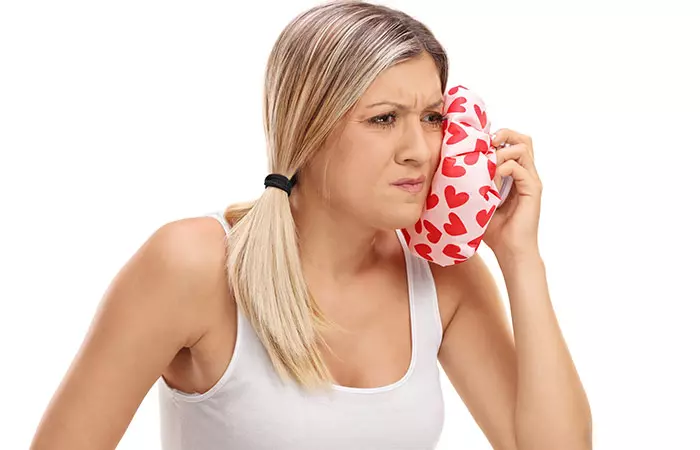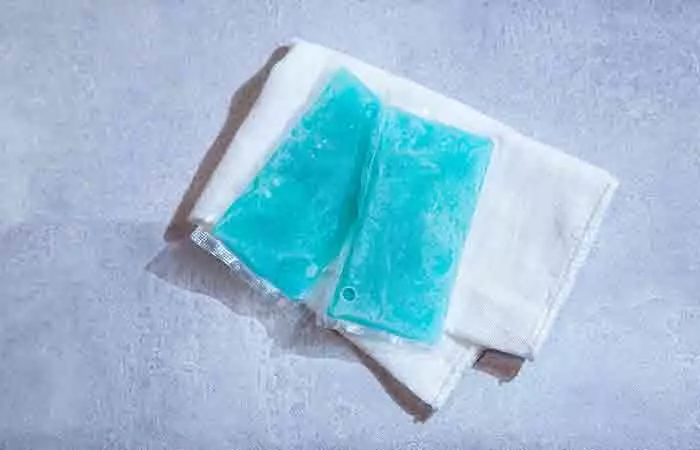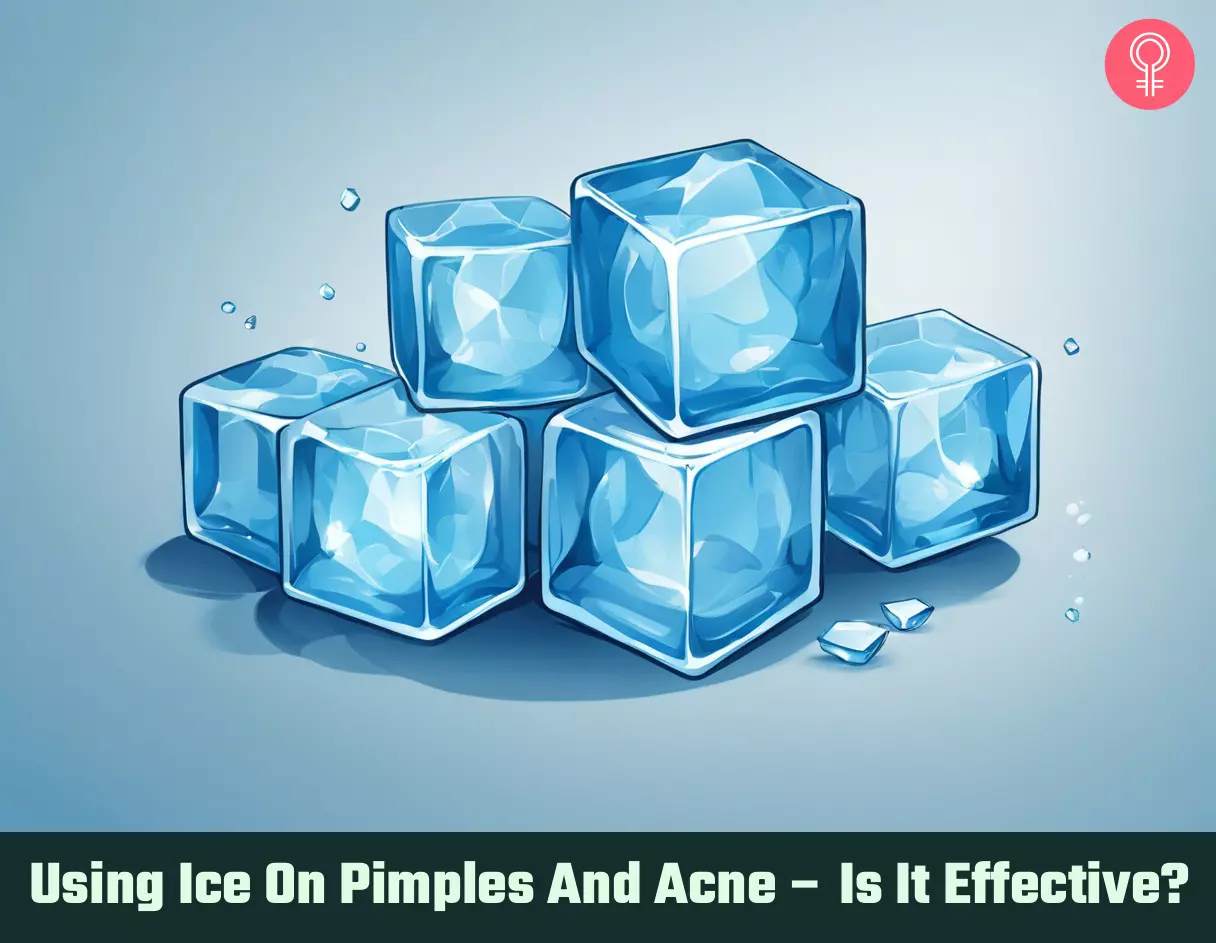Ice cannot cure acne and pimples, but does ice help treat acne? However, it is an effective remedy for providing temporary relief and may help you manage the breakouts in various ways. Before you reach out for the ice cube, read this article to understand how ice can help acne, how to use it properly, and precautions to take. Scroll down.
Ice For Acne: Does An Ice Cube Help Heal Acne And Pimples?
Using cold treatment for healing acne is not new. This idea was conceived in 1925 by Giraudeau. He proposed using acetone, carbon dioxide snow, along with sulfur for treating acne (1). If you are wondering how to prevent acne, an English physician, James Arnott, advocated using cold treatment for relieving acne (2). Ice therapy has incredible benefits for acne – and they are discussed below:
1. It Reduces Swelling And Inflammation
Sounds promising. Redness and swelling can be an absolute nightmare when you are dealing withcystic acnei A severe form of acne that develops when pus-filled cysts, which can be large and painful, form deep underneath the skin. . When you apply ice on the acne or pimple, it constricts the blood vessels and reduces inflammation (3). Ice has a numbing effect on your skin and slows down the blood flow. This gives you instant relief.
2. It Helps In Shrinking Pores
One of the main causes of acne is clogging of skin pores due to the accumulation of dirt and dead skin cells. Further bacterial invasion gives rise to acne in those areas. Ice packs help in tightening the skin pores so that bacteria and other irritants cannot clog them. Putting ice on your acne is one of the most amazing home remedies that can only help if it is a case of inflammatory acne. This means you will get relief if you put ice on papulesi Small, raised bumps of less than 1 cm that do not have pus developed due to excess oil and dead skin cells clogging the pore. , cysts, nodules, and pustulesi Small, inflamed, blister-like sores on the skin filled with white or yellow pus that can develop anywhere on the body. . Ice will not work on non-inflammatory acne. In other words, it won’t work on your blackheads and whiteheads. Before you put ice on your face, it is important to learn how to use it – because ice can burn your skin and increase the irritation if you do not apply it in the right way.
How To Apply Ice On Acne Or Pimples For Quick Relief
If you’re wondering how to get rid of pimples, consider following a combination of skincare routines, such as using ice to reduce inflammation and topical treatments for clearer skin. Avoid applying ice directly to your face. Here are a few ways you can follow for safe application:
1. Make An Ice Pack
Wrap the ice cubes in a towel or put them inside a sandwich bag (if you have one). You can also use a cotton cloth to wrap a single cube. Rub it on the affected area for about 10 minutes. Take a break for 3-4 minutes and then reapply. Make sure you never use ice on your skin for more than 20 minutes. Asha, a blogger, shared her successful experience with the ice cube remedy for acne. She emphasized, “Yes, I have been using this technique for a while and I have noticed a change after every use, especially, the morning after (i).” Describing the technique, she outlined a simple process of rubbing an ice cube over her face in circular motions, focusing on potential breakout areas. She recommended the method for those experiencing acne, highlighting its pocket-friendly nature and absence of reported side effects.
2. Incorporate Ice Or Cold Water Into Your Skin Care Regimen
If your acne is mild, you may skip the ice cube. Using cold water on your face can have similar effects. Splash cold water on your face in the morning and evening. A gentle cleanser is enough to keep your skin clean. However, you can always use ice packs on mild acne. Apply a cold compress on your skin for 5 minutes before going to bed.
3. Make An Infusion
You can mix water, a few drops of lemon juice, and a few drops of tomato juice and then freeze it. Rub the ice cube on the affected area. But keep in mind, according to dermatology, if your skin is sensitive or excessively dry, avoid lemon juice as it is highly acidic and might cause skin harm. You can also brew some tea (use green or chamomile teas) and then freeze it. Rub the frozen tea cubes on your face.
4. Dip Your Face In Ice Water
Take cold water in a bowl. Add ice cubes to it. You can even add chunks of lemon and cucumber to the water. Dip your face in the water for a few seconds. Repeat the process for 2 or 3 minutes. Rubbing ice on acne or pimples seems to be a simple way to treat them. However, this approach is not devoid of side effects. Learn more in the next section.
Disadvantages Of Rubbing Ice On Face
Using ice on the skin may temporarily slow down blood flow. While this may have short-term benefits, it may not help in the long run or boost one’s overall skin health. Using ice on the face too frequently may induce headaches as the skin is being exposed to sudden temperature changes that damages the capillaries. Additionally, those with sensitive skin must refrain from rubbing ice on their face as it may otherwise cause irritation and make their skin even more sensitive. It is essential you consider these possible adverse effects. More importantly, you also must take certain precautions. Know more in the next section.
Things To Know Before Applying Ice On Acne Or Pimples
When you apply ice on acne, it might cause the pus to move up to the surface. Though it may be tempting to pop it, avoid doing so because popping acne or pimples can worsen the inflammation and may even cause scarring. Be careful with ice. If you keep it on your skin for too long, it might give you frostbitei A condition in which the skin and tissue below the skin freeze, causing numbness and discoloration. . Hence, apply it at short intervals. Consult a doctor if you notice any adverse effects such as redness and numbness in the affected area. When rubbing ice, be gentle. Any friction or irritation can aggravate the acne. If you are using a hot compress (to open the skin pores), always use it before using ice on your face. Never use a warm compress after applying ice as it might damage the skin further.
Acne is troublesome – and that’s why you need to be patient. Give your skin some time to recover. While ice treatment can provide you with instant or temporary relief, it is not the only thing you should rely on for treating your acne. Check your lifestyle habits, talk to your doctor, and act accordingly. How long does ice take to remove pimples? Ice alone cannot help cure pimples. It can aid faster relief but you need to take proper treatment measures as well. Can I use ice on my face everyday? Yes, you can make it part of your skin care routine every day, but make sure to notice any adverse reactions, keep your skin stress-free, and well-moisturized. Does ice help pimples overnight? Ice can only help reduce the inflammation caused by pimples and provide some relief from the pain. Can ice help prevent new pimples from forming? Possibly not. While ice application may constrict blood vessels and pore size, it may not be able to prevent the formation of some pimples caused due to hormonal or diet imbalances. Can ice be used as a natural alternative to acne medication? Possibly not. Acne is caused by a variety of factors and specific medications have been formulated to deal with them. Ice application may not be appropriate to combat all types of acne and should not be used as an alternative to medications. Are there any specific types of acne that are more responsive to ice treatment? The use of ice may be effective against inflammatory acne but not non-inflammatory ones caused due to clogged pores. How does ice compare to other at-home remedies for acne, such as tea tree oil or honey masks? This depends on the type of acne and the skin type. For some, ice may help reduce the appearance of acne while for others honey and tea tree oil may work as they have antibacterial properties, which may help treat acne. When is it time to seek professional treatment for persistent or severe acne? If you experience pain, discomfort, or fever, if the acne does not respond to home remedies or OTC medications, or notice scarring, seek professional help.
Illustration: Using Ice On Pimples And Acne – Is It Effective?
Watch the video below to uncover the incredible results of rubbing ice cubes on your face for seven consecutive days. Witness the transformative effects it had on the skin and how it affected acne breakout.
